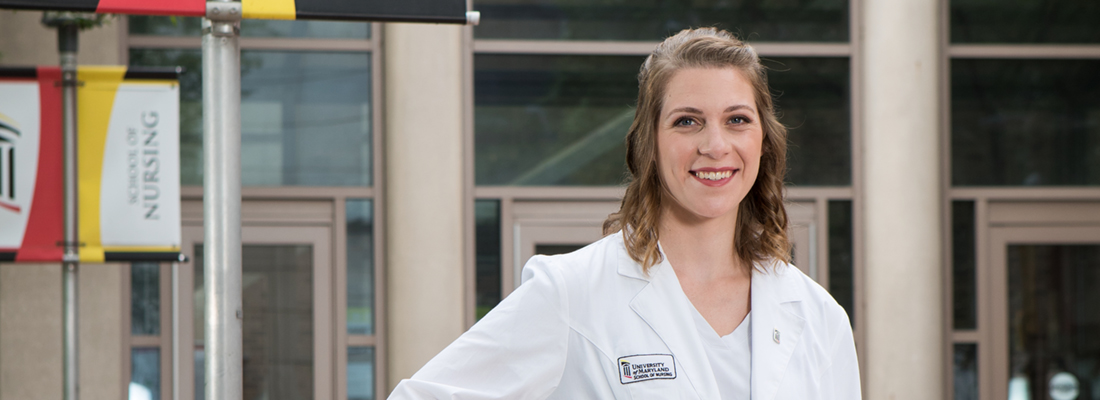Julie Factor | University of Maryland School of Nursing
View Full 2017-2018 Champions of Excellence Gallery Find Out More About the Champions of Excellence Campaign
Every day, news networks are filled with stories about the opioid epidemic plaguing our nation. According to the Centers for Disease Control and Prevention (CDC), the death toll from drug overdose in the U.S. was five times higher in 2016 than in 1999, totaling more than 42,000 deaths — a startling statistic.
In the search for solutions, a new generation is stepping up to tackle this issue. Among them is Julie Factor, a student at the University of Maryland School of Nursing who is pursuing her Bachelor of Science in Nursing with a focus on substance abuse.
She chose the University of Maryland, Baltimore (UMB), she says, “because I knew that the nursing program was highly regarded, and there were a variety of resources at the school that could help me maximize my success.”
And success is certainly what she’s found at UMB. In her first year at the School of Nursing she’s already received major recognition, having been selected for the Conway Scholarship, accepted into the President’s Student Leadership Institute, receiving summer research grants, and getting involved in a variety organizations on and off campus.
In her undergraduate studies as a neuroscience major at Mount Holyoke College, Factor’s favorite courses were related to pharmacology and psychology. She was interested in how dynamic changes in the brain can influence a person’s motivation to continue to use drugs despite adverse consequences — and substance abuse became a natural research path.
But Factor understood that addiction couldn’t just be boiled down to a person’s mental health. She sought to know more about the many factors of addiction and overdose so she could better understand how to treat it.
“[Drug use] is multidimensional,” she says. “There is a biological and genetic aspect, but so much of what drives drug seeking is a person’s environment, support system, and access to different resources in their community including treatment, health care, education, and more.”
As she dives into her research, Factor will spend 10 weeks this summer working on an epidemiologic study with the Center for Substance Abuse Research at the University of Maryland, College Park (UMCP) through the UM Scholars Program, part of the strategic partnership between UMB and UMCP. The study will look at trends in drug-related hospital admissions to better understand patterns of synthetic cannabinoid, opioid, and other drug use. Revealing areas where there may be contaminated batches of drugs or increasing rates of use can inform intervention strategies.
The day after she completes this internship, Factor and two other students will travel to Rwanda for three weeks through UMB’s Center for Global Education Initiatives grant program. Working at a health clinic in the capital city of Kigali, the team will administer a survey to assess the prevalence of injection drug use and associated practices that increase a person’s chance of contracting HIV, including sharing syringes and having unprotected sex.
The team’s main goal is to make the first assessment of injection drug use and associated HIV risk behaviors in Kigali, which will inform the national HIV program in Rwanda and set the stage for incorporating injection drug use questions into the next national HIV/AIDS Behavioral Surveillance Survey. The data is important to the team, but the free HIV testing offered as a part of the survey will benefit all participants.
Outside of this research, Factor is an active member of Nurses for Justice Baltimore, a group promoting a vision of health and justice for all Baltimore residents. Members use their trusted status as nurses to advocate for progress in public health measures in the community.
Currently, they are focusing on harm reduction for substance users by advocating for safe consumption spaces, needle exchange programs, and overdose prevention training. Through panel discussions and informational events, nurses and members of the public learn how to be advocates for change.
Through her involvement in Nurses for Justice Baltimore, Factor has realized advocacy is one of her main passions.
“[Substance abuse] is so stigmatized. An important goal going forward is to challenge the bias associated with substance abuse, especially within health care professionals,” she says.
Factor believes changing the attitude of health care providers can significantly improve patient outcomes and help substance abuse be treated as a public health and social justice issue.
She emphasizes that patients with substance use disorders may be hesitant to seek help from medical professionals for fear of judgment and reprimand.
“You can’t scare an addiction out of somebody. And you can’t tell them that all it takes is willpower to recover,” she says. “It is more effective and therapeutic to have a productive conversation with the patient, ask about treatments they’ve tried in the past, what has worked for them, and present options on how the team will collaborate to move the patient forward.”
Encouraging treatment in a space where health counselors are nurturing and empathetic toward patients brings a human aspect to intervention and can lead to a better chance for recovery.
“People think [substance abuse] is a fault or character flaw of the individual person, but advocacy is about challenging that idea and encouraging medical professionals to provide high-quality care while treating the patient with dignity and respect,” she says.
The potential for change is endless, and when Factor completes her degree in May 2019 she is poised to be a real stigma changer in her community.
“I chose nursing because I can practice, I can travel, I can educate, and I can get into policy,” she says. “There are so many avenues to have an impact as a nurse, and we have a unique opportunity to change people’s perspectives and challenge their biases.”



